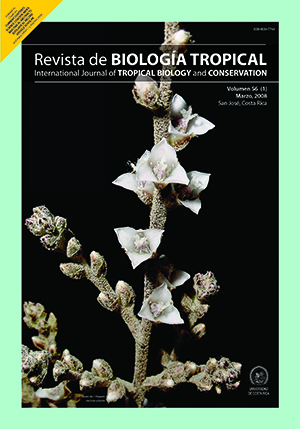Abstract
In tropical dry forests most plants are deciduous during the dry season and flush leaves with the onset of the rains. In Costa Rica, the only species displaying the opposite pattern is Bonellia nervosa. To determine if seasonal changes in light availability are associated with the leaf and reproductive phenology of this species, we monitored leaf production, survival, and life span, as well as flower and fruit production from April 2000 to October 2001 in Santa Rosa National Park. Leaf flushing and flower bud production took place shortly after the autumnal equinox when day length starts to decrease. Leaves began expansion at the end of the wet season, and plants reached 70 % of their maximum leaf area at the beginning of the dry season, maintaining their foliage throughout the entire dry period. Leaf shedding occurred gradually during the first three months of the wet season. Leaf flushing and shedding showed high synchrony, with leaf numbers being related to light availability. Maximum leaf production coincided with peaks in radiation during the middle of the dry season. Decreasing day length induces highly synchronous flower bud emergence in dry forest species, but this is the first study indicating induction of leaf flushing by declining day length.##plugins.facebook.comentarios##

This work is licensed under a Creative Commons Attribution 4.0 International License.
Copyright (c) 2008 Revista de Biología Tropical
Downloads
Download data is not yet available.






